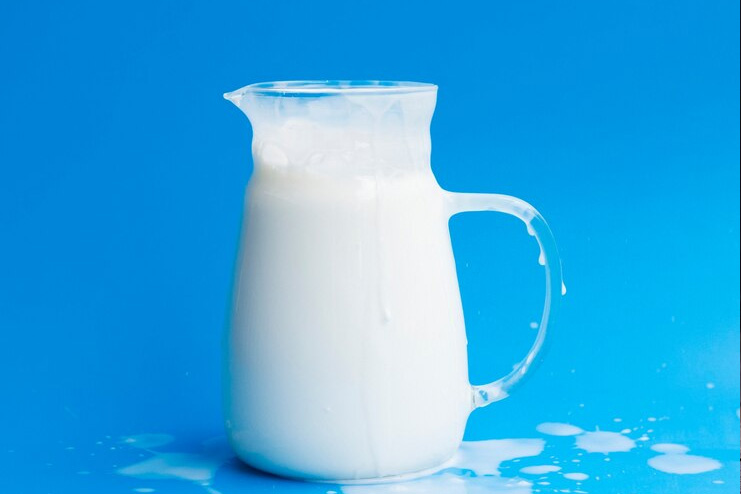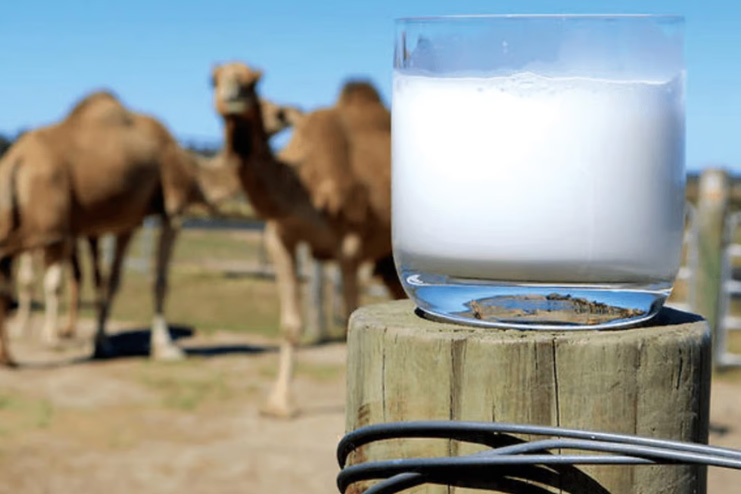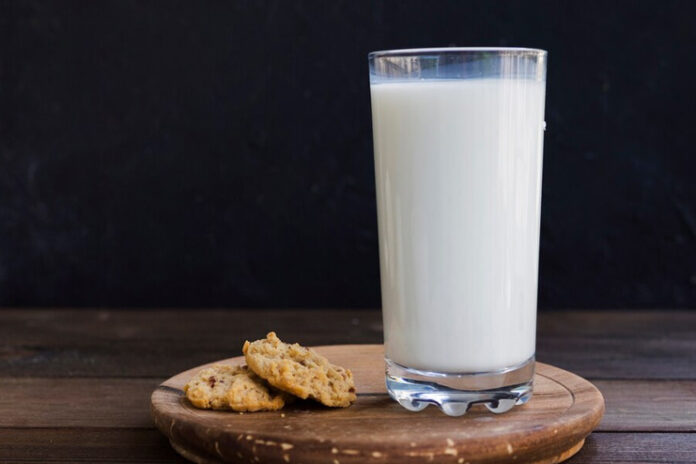Affiliate Disclaimer
Some links in this article are affiliate links. We may earn a small commission if you make a purchase through these links, at no extra cost to you. We only recommend products we find useful to our readersTraditionally consumed in arid areas, camel milk is rapidly becoming well-known in the worldwide health and wellness sector. It is famous for having a distinct nutritional profile and drawing in researchers and health enthusiasts with many advantages that outweigh cow’s milk. This article explains why camel milk is becoming a superfood by highlighting its eight unexpected health benefits. The unique benefits of camel milk, such as increased immunity and improved digestion, make it an invaluable addition to any diet that prioritizes health.
Why Camel Milk?

The distinctive nutritional profile of camel milk, which distinguishes it from other dairy products, is the source of the growing interest in this product. A nutrient-dense alternative to cow’s milk, camel milk is rich in vitamins such as B and C, minerals like iron and calcium, and contains more good fats than cow’s milk. As a result of its lower lactose content, it is an option for individuals who are lactose intolerant. It is also effective for the management of diabetes because of the high quantities of insulin-like proteins that it contains.
In many parts of the world, particularly in the Middle East, Africa, and certain portions of Asia, camel milk is traditionally of great cultural significance. Nomadic tribes have relied on it as a dietary mainstay for ages, valuing it for its nutritional benefits and medical virtues. Several disorders, including tuberculosis, diabetes, and gastroenteritis, have been traditionally treated with this substance. Even though modern science is beginning to support these age-old traditions, interest in camel milk continues to rise worldwide, merging traditional wellness practices with new health trends.
Nutritional Profile of Camel Milk

Among the various dairy products available, camel milk is a noteworthy option due to its extraordinary nutritional profile. It contains three to five times more crucial vitamins, such as vitamin C, than cow’s milk, which helps strengthen the immune system. Additionally, it has a substantial quantity of B vitamins, most notably B1 (thiamine) and B12, which are essential for producing energy and properly functioning the nervous system.
Calcium, magnesium, and potassium are essential for maintaining strong bones, proper muscle function, and general cardiovascular health. Camel milk is an excellent source of all three of these minerals. In addition, it has a higher concentration of iron than cow’s milk, which helps improve oxygen transport and prevent anemia.
The protein composition of camel milk is unique because it contains proteins that resemble insulin and can help control blood sugar levels. This trait is one of the distinctive characteristics of camel milk. In addition, camel milk has a lower composition of lactose and a higher concentration of immunoglobulins and lactoferrin, which enhance its anti-inflammatory and antibacterial characteristics. Because of these one-of-a-kind characteristics, camel milk is an excellent source of nutrients and a potential treatment for a wide range of health circumstances.
Eight Shocking Health Benefits of Camel Milk:
Improved Immune Function

It is abundant in immunoglobulins and antibodies, essential to strengthening the immune system. These components help the body more effectively combat infections and diseases it may encounter. Research has demonstrated that camel milk, compared to cow’s milk, includes more immunoglobulins, strengthening immune support. The findings of a study published in the “Journal of Dairy Science” highlighted the presence of unusual proteins in camel milk. These proteins possess antibacterial and antiviral capabilities, making camel milk a powerful ally in strengthening the body’s natural defensive mechanisms.
Digestive Health Enhancement

The high lactoferrin content significantly contributes to the improvement of the gut health of camel milk. As a glycoprotein, lactoferrin is well-known for its anti-inflammatory and antibacterial capabilities. These properties contribute to the maintenance of healthy gut flora and the prevention of gastrointestinal problems. According to testimonials, people who eat camel milk regularly have reported improved digestion and relief from diseases like irritable bowel syndrome (IBS). A study published in “Healthwire” discovered that the lactoferrin present in camel milk can limit the formation of pathogenic bacteria in the stomach, which is beneficial to the digestive system.
Management of Diabetes

Research has shown that the use of camel milk may be beneficial in terms of regulating blood sugar levels and improving insulin sensitivity. It has been established through research carried out in India and Saudi Arabia that people with type 1 diabetes who consume camel milk daily see a considerable reduction in their blood glucose levels. The insulin-like proteins found in camel milk mimic the properties of insulin, which results in increased glucose uptake and utilization. Additionally, clinical trials are currently being conducted further to investigate its potential as a supplemental treatment for diabetes, and preliminary results have shown that they are promising.
Heart Health Benefits

Camel milk is helpful for the heart’s health since it contains a high potassium concentration and a low cholesterol content. Potassium has a role in regulating blood pressure by equalizing sodium levels within the body, reducing the likelihood of developing hypertension. A study published in the journal “National Library of Medicine” found that consuming camel milk daily can lead to improved cardiovascular health markers, such as decreased cholesterol levels and enhanced heart function. Based on these data, camel milk may be a possible alternative to other dairy products that are better for the heart.
Bone Strength Improvement

Camel milk is an very excellent source of calcium and phosphorus, two essential nutrients for avoiding osteoporosis and maintaining healthy bones. Additionally, combining these minerals helps improve bone density and strength. Compared to cow’s milk, camel milk offers amounts of these nutrients comparable to, if not above, cow’s milk. The findings of a study published in the “Springer article” reveal that the bioavailability of calcium in camel milk is higher, which makes it a more compelling choice for promoting bone health.
Skin Health Enhancement

Both the lactic acid and vitamin C found in camel milk help the appearance of healthier skin and more young. Exfoliating the skin with lactic acid is a gentle process which removes the dead skin cells and encourages the turnover of new cells. Vitamin C is a potent antioxidant that possesses the ability to decrease inflammation and increase the formation of collagen. Those who use skincare products containing camel milk have reported a substantial improvement in the texture of their skin and a reduction in acne and redness. Anecdotal evidence showing that many people appreciate the product’s moisturizing and anti-aging effects backs up these claims.
Allergy Management

As a result of its hypoallergenic features, camel milk is an excellent alternative for people who are allergic to cow’s milk. Because it contains proteins distinct from those found in cow’s milk, it is less likely to cause allergic reactions by triggering allergic reactions. Clinical investigations published in the journal “camelmilkforhealth” demonstrated that they can tolerate camel milk without experiencing any detrimental effects in youngsters who are allergic to cow’s milk. According to some experts, camel milk is a viable alternative to dairy products for individuals looking for a dairy substitute that is free of common allergens.
Weight Management Support

Camel milk’s distinctive composition, which includes a well-balanced fat content and high protein levels, can be beneficial to controlling one’s weight. Proteins contained in camel milk enhance satiety, which in turn helps reduce overall calorie consumption. In addition, compared to other dairy products, it has a lower fat level, making it an excellent alternative for individuals trying to reduce their body fat percentage. The results of a study published in the journal “aimspress” suggest that including camel milk in a diet that is otherwise well-balanced can help assist attempts to lose weight and enhance metabolic health.
Because of these extraordinary health benefits, camel milk is becoming an increasingly very popular choice among people concerned about their health. This choice bridges the gap between traditional knowledge and contemporary nutritional science.
How to Incorporate Camel Milk into Your Daily Diet

Consuming camel milk is easier than you would believe it is to incorporate into your diet. Listed below are some helpful hints and mouth-watering recipes that will assist you in getting started:
Breakfast Smoothies: When making your morning smoothie, try substituting camel milk for your usual milk. You can get a nutritious start to your day by blending it with fruits such as bananas, berries, and a handful of spinach at the beginning.
Coffee and Tea: If you want your coffee or tea to have a more creamy texture, try adding camel milk. Its slightly sweet flavor goes well with beverages.
Breakfast Cereal and Oatmeal: Pour camel milk over your favorite cereal or oatmeal for breakfast. Both are loaded with nutrients.
Baking: You can use camel milk instead of regular milk in recipes that call for regular milk. Cakes, muffins, and pancakes are great places to use because they impart a distinctive flavor and provide additional fiber.
Soups and Sauces: To produce rich, creamy foods, substitute camel milk for cream or ordinary milk in soups and sauces.
Trustworthy brands that guarantee good quality and ethical business practices are essential when looking for camel milk. If organic and pasture-raised products are available, you should choose them. Camel milk can be purchased at health food stores, specialist grocery stores, and websites selling products online. Always check the expiration date and storage instructions to guarantee that the product is still fresh.
If you follow these guidelines and experiment with new dishes, you can reap the health benefits of camel milk while simultaneously incorporating more diversity into your diet.
Conclusion
There are a multitude of health benefits that may be derived from camel milk, including the management of diabetes and the promotion of heart health. Camel milk also helps to improve digestive health and immune function. It stands out from other dairy products due to its extensive nutritional profile, including vital vitamins, minerals, and proteins not found in other dairy products. Additionally, camel milk helps maintain healthy bones, skin, and allergies, controls weight and promotes weight management. Integrating camel milk into your diet may be a worthy idea if you want to improve your general health and well-being. This is because camel milk has several surprising health benefits. Explore the myriad methods by which you can take pleasure in this nourishing beverage and discover the potential health benefits it might bring.
-
Sep 2019Written by Somapika D
-
July 2024Edited by Ankita
In this Article



















